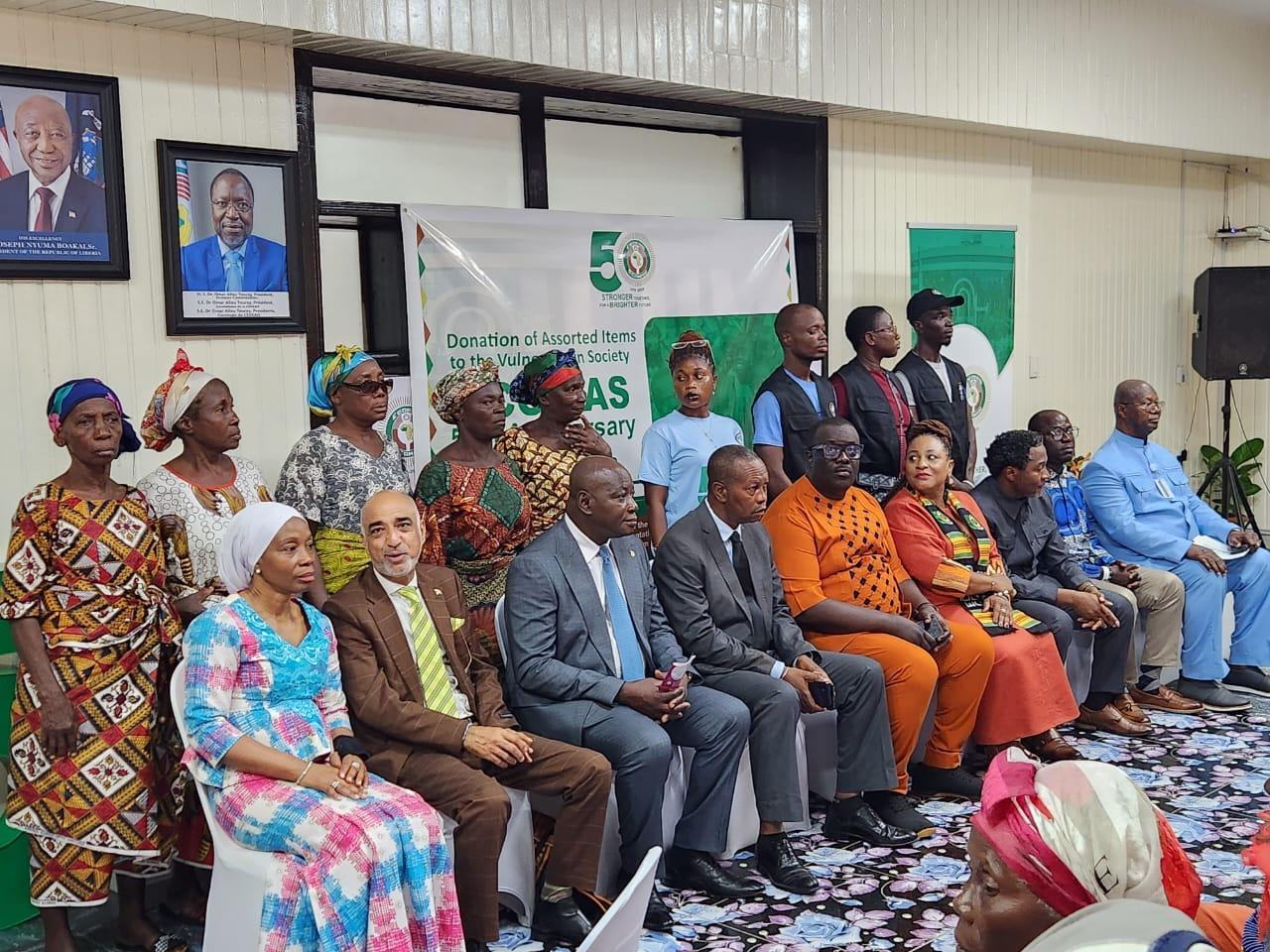Africa-Press – Liberia. Ambassador Josephine Nkrumah, pointed out that that drug abuse has become an “existential threat” across West Africa, stressing that it must be treated as a health and rehabilitation issue rather than solely a crime.
The Economic Community of West African States (ECOWAS) has placed the spotlight on youth empowerment and drug rehabilitation as it celebrated its 50th anniversary in Liberia with call by policymakers for urgent and concrete steps in tackling what has been described as an “existential threat” to the region’s future.
The day marked by solidarity and outreach in Monrovia, ECOWAS donated food, school supplies and rehabilitation equipment to orphanages, elderly women, and drug treatment centers, signaling its shift toward people-centered development.
The donations were based on a needs assessment – Mother of Light Rehabilitation Center: televisions, freezers, speakers, and a PlayStation set, St. Benedict Rehabilitation Center: sewing machines, training materials, and detergents and Violence Against Youth Center: 30 bags of rice, beans, and assorted food items.
Speaking at the ceremony marking the donation held at ECOWAS’ Headquarters in Monrovia, ECOWAS Resident Representative to Liberia, Ambassador Josephine Nkrumah, pointed out that that drug abuse has become an “existential threat” across West Africa, stressing that it must be treated as a health and rehabilitation issue rather than solely a crime.
With over 70 percent of the sub region’s population under 35, Amb. Nkrumah indicated that saving young people from drugs and social exclusion is no longer optional, but an imperative.
Predicated upon this, she said ECOWAS is now moving away from state-focused programs to community interventions that prioritize vulnerable groups.
She revealed that a new drug treatment facility has been completed in Totota, Bong County, and will soon be turned over to Liberia’s Ministry of Health
“Drug abuse is not just a crime; it is a health and rehabilitation issue. If we are to protect our future, we must reintegrate rather than marginalize our youth,” she asserted.
She recalled that ECOWAS recently launched a 2025–2026 Social Protection Framework to better safeguard vulnerable groups and has also stepped-up humanitarian programs in Liberia, including US$1 million in aid to five flood-affected counties.
The ECOWAS envoy also disclosed about the completion of a new drug treatment facility in Totota, Bong County, which will soon be turned over to the Ministry of Health.
As ECOWAS turns 50, Amb. Nkrumah added the sub regional body’s mission is clear – to build a community that invests not just in states, but in the people, especially the young, who hold the future of West Africa.
In remarks, the Minister of Youth and Sports, Cllr. Jeror Cole Bangalu, urged partners to scale up rehabilitation programs, given that nearly three-quarters of Liberia’s population is under 35.
Community beneficiaries welcomed the outreach.
As he commended ECOWAS for its continued support, the MYS boss revealed that Liberia will soon host the headquarters of the ECOWAS Youth and Sports Development Center.
“With nearly 74 percent of Liberia’s population made up of youth, everything we do must prioritize their future,” Minister Bangalu stated.
“We must celebrate the many young Liberians excelling in medicine, sports, and other fields, while also supporting those who are vulnerable to drugs and substance abuse.”
Minister Bangalu asserted that the Government of Liberia through the Ministry of Health is constructing a 350-bed psychiatric hospital in Bensonville, while it has through the Ministry of Youth and Sports, has completed a dormitory facility to be used for youth rehabilitation.
He urged international partners, including ECOWAS, to support the establishment of “spontaneous rehabilitation centers” to meet the growing needs of at-risk youth.
Abdullah Shenyi, General Manager of the Mother of Light Drug Rehabilitation Center, said the donations would strengthen efforts to restore young lives.
“Drug abuse destroys potential and weakens families. Rehabilitation and reintegration are the only way to give our youth a second chance.”
The program formed part of ECOWAS’s new Social Protection Framework (2025–2026), which includes targeted support for at-risk youth, climate-smart agriculture training for households, and aid to flood-affected counties.
For More News And Analysis About Liberia Follow Africa-Press






